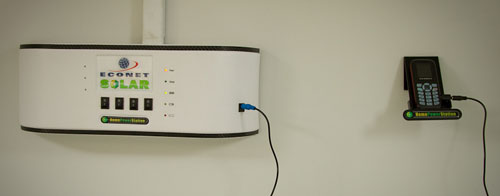
Econet Solar, a subsidiary of African mobile phone operator Econet Wireless, has launched a prepaid solar-powered home power station that it believes could have a meaningful impact on people’s lives on a continent where an estimated 70% of people not have access to a reliable supply of electricity.
The company will begin trialling the first-generation of a new product that provides lighting and the ability to charge cellphones using the same systems and in the same way airtime is purchased for mobile phones.
Econet says this will remove the requirement for consumers to incur high up-front costs, which prevent hundreds of millions of people in Africa from benefiting from solar-powered systems in their homes.
The “Home Power Station” uses a solar panel to charge a battery, which then provides power for four lights and a cellphone charger, the company says. Future generations of the product will serve homes of all sizes as the business model is “fully scalable”.
Econet Solar has developed a patented power-control module linking the Home Power Station to the cellphone network. It will begin trials of the product in several countries in the next few weeks and expects it to be available commercially in the first half of 2012.

“The Home Power Station will be available at a small upfront cost, with customers paying for the electricity generated as they use it,” the company says. “Econet Solar will work closely with Econet Wireless to make the Home Power Station available to its millions of cellphone customers in Africa. In time, Econet Solar will seek to establish licensing agreements with other mobile network operators in developing countries to make the product available to their respective customer bases.”
Econet Wireless founder and chairman Strive Masiyiwa says more than 500m people in Africa are living in areas where there is no access to a reliable source of power. “If we are to improve the lives and prospects of Africans living beyond the reach of the grid, it is important that we find practical and sustainable solutions to meet their needs.
“Though there are already well-intentioned solar powered lighting systems on the market, the reality is that they are just too expensive for people to afford. We are launching the Home Power Station to change all that,” Masiyiwa says.
The solar power station includes four LED lights, a controller, a battery, a solar panel, cabling and a cellphone charger. It has been designed to light up to four rooms of 3mx3m each for a period of up to five hours a day. The photovoltaic solar panel replenishes one day’s usage in half a day’s sunshine. The battery has a design life of five years.
It also displays the battery condition, charge status, when energy levels are low, when battery power is low, when credit balance is running low and the GSM communication status.
The Home Power Station includes a Sim card that allows the device to communicate with the cellular network, which consumers can then use to top up their accounts. — Staff reporter, TechCentral
- Subscribe to our free daily newsletter
- Follow us on Twitter or on Google+ or on Facebook
- Visit our sister website, SportsCentral (still in beta)

